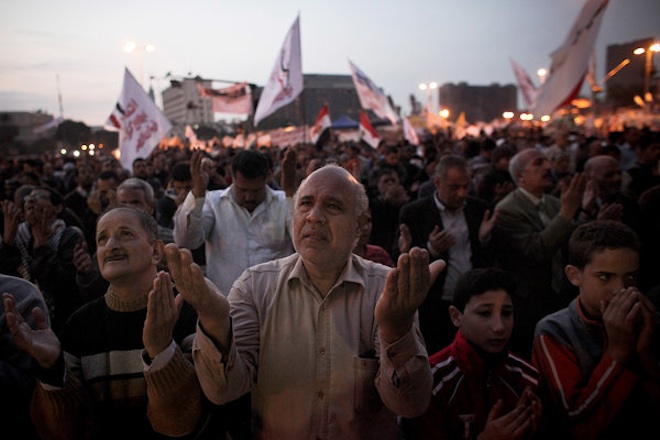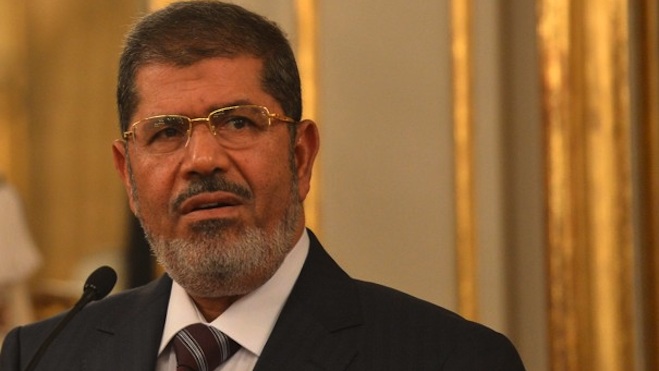Morsi crosses a great river
 Stephen Keim & Mary B. Ayad •
Stephen Keim & Mary B. Ayad •  Saturday, December 15, 2012
Saturday, December 15, 2012 Egyptians (some of them) vote to ratify a flawed Constitution ... Grab to entrench Islamist power ... Pluralism unlikely to succeed ... More for Morsi ... Background to Egypt's convulsion from Stephen Keim and Mary Ayad
 Opponents of President Morsi pray in Tahrir Square before the vote (pic: NYT)
Opponents of President Morsi pray in Tahrir Square before the vote (pic: NYT)
IN late 2010 and early 2011 Egypt experienced the excitement of the Arab Spring. On 11 February 11 last year President Mubarak stood down from office. A revolution had taken place.
In a very Egyptian touch, the Supreme Council of the Armed Forces (SCAF) appointed themselves trustees of the revolution until elections could be held. It turned out to be a long interim period.
It was not until late June 2012 that the second round of the presidential election took place and Mohammed Morsi was elected president.
President Morsi was the candidate of the Muslim Brotherhood. He defeated Ahmed Shaffiq, a remnant of the Mubarak regime. Shaffiq had been Mubarak's last and short lived Prime Minister.
The run-off election was something of a Hobson's choice for the forward looking, young and educated supporters of the revolution: a representative of the Islamist Muslim Brotherhood or Back to the Regretted Past.
There are two well-known recent precedents of Islamist governments in the region.
In 1979, the Mullahs of Iran under Ayatollah Khomeini stole a middle class revolution and plunged that country into repressive theocracy. That theocracy is still alive and, despite some brave efforts to achieve change, remains firmly in power.
Another precedent was the election of the Islamist Justice and Development Party led by Recep Tayyip Erdogan as the government of Turkey in 2002 and in subsequent elections.
There were fears that traditionally secularist Turkey would also become a theocracy. Those concerns have proved largely unfounded and Erdogan's leadership has been generally moderate and progressive.
The months since his election have confirmed the view that Morsi does not respect the rule of law. He seems to have left the democratic path in favour of one party rule or dictatorship.
Always there have been excuses. It had seemed comfortable to give President Morsi the benefit of the doubt.
Then came the decree of November 22.
With a "responsibility to save the revolution" preamble, it is a seven article, one page document.
Article 1 seeks to establish an "all bets are off" approach to investigations and prosecutions concerning officials responsible for violence against protestors, referred to by the all-encompassing term "revolutionaries".
Double jeopardy applies to those already acquitted.
Article 3 makes provision for the appointment of a prosecutor-general with a four year term.
Article 2 has produced the strongest reaction. It, temporarily (until the new constitution and new People's Assembly are in place), puts beyond judicial questioning the president's former decrees.
Article 5 does the same thing for the existing upper house.
Article 7 protects the decree, itself.
As Chibi Mallat, chairman of the NGO, Right to Non-Violence, and currently at Yale, points out, the decree is an outrageous attempt, in legal and constitutional terms, to lift-up the Islamist regime by the boot straps.
The fact that SCAF tried the same practice makes the situation all the more disturbing.
The constitution was drafted after the liberals and progressives walked out in protest.
It runs to 236 articles and 31 pages. It provides for a presidential system with two houses of parliament and an independent judicial power, including constitutional and administrative courts.
Similar to European systems, much of the presidential power is to be exercised through a prime minister and a cabinet.
Like the US constitution, it contains an impressive number of constitutionally protected rights.
It also provides for organs of government, including a central bank and central auditing organisation.
However, there are aspects of the draft donstitution that cause concern.
 Morsi: taking on the judges
Morsi: taking on the judges
Article 1 speaks of the Arab Republic of Egypt and states that the Egyptian people are part of the Arab and Islamic nations.
Article 2 makes Islam the religion of the state; Arabic its official language and principles of Islamic Sharia the principal source of legislation.
The role of women in the new Egypt is affected by article 10, which talks of the family as founded on religion, morality and patriotism and the state's keenness to preserve the genuine character of the Egyptian family.
The freedom of belief in article 43 must be a very private freedom because article 44 prohibits insult or abuse of all religious messengers and prophets.
The first round of voting to ratify the Constitution is underway today (Dec. 15).
President Morsi's strength, until recently, was that the institutions with which he was in dispute, the armed forces and even the judiciary, were subject to legitimate criticism, both for their recent action and their links with the ancien regime.
Even when the president's actions were arbitrary and undemocratic, there was weight in the argument that they were necessary to preserve the revolution and pave the way for future democracy.
That is no longer plausible.
The rush to approve a flawed constitution has unmasked the pretence.
Defenders of a pluralist revolution are in the street. They are pitted against the Islamists with whom they had created and enjoyed the the Egyptian Spring.
The Islamists are not defending the president or the revolution. They are defending their Constitution, which is the pathway to entrenched power.
President Morsi benefited from the revolution and has claimed to defend it, yet he has succeeded in splitting the revolution and the country.
Stephen Keim and Mary Ayad
 Eqypt,
Eqypt,  Muslim Brotherhood
Muslim Brotherhood 









Reader Comments